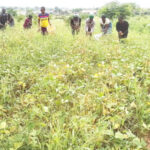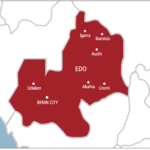Lack of agricultural extension workers has over the years subjected local farmers to trial and error as a strategy in cultivating crops like rice in Katsina State.
There was massive cultivation of the crop in the state this year, and those that planted early have started smiling to the bank with the price of paddy rice starting from N16,000 a bag.
‘Why I left pharmacy for agriculture’
Border closure should be sustained to create more agric jobs
It was observed that local farmers in the state could not differentiate rice varieties by their scientific or brand names, instead, they named them based on their features, duration of maturity and towns renowned for their cultivation.
This reporter gathered from the farmers that even the rice seeds were mostly sourced from the open market and not agric research institute, or government agric institution.
Saminu Abdullahi, a rice farmer in Malumfashi LGA, said because they have no access to improved seeds and relevant information on rice production, many of them have suffered devastation by a fungal disease in their farms.
“High demand for the produce this year is what saved most of us otherwise we would not have realized any meaningful profit from rice production. We cannot certainly say if it was a disease or the effect of manure on the crop.
“Some of our elders made us believe that rice does not agree much with manure, particularly that of ash and humus. The plants become pale and rusty as well as stunted despite the application of fertilizer,” Abdullahi said.
He added that they had no place to take their complaints to or contact for solutions but to resort to trial and error.
“Sometimes we rely on the advice of pesticides sellers which are commercially inclined. But there is no alternative to that because even our seeds are sourced from the open market. That is why we gave the varieties local names like Yar’gidan Daudu, Yar’zuru, Yar’suru, Jeep, Jamila, Me bakin carki, Jirani bazawara etc,” the farmer also said.
Yuhah Andrew, an agricultural expert based in Zaria, Kaduna State said this year, most rice farms suffered a fungal disease called Sheath blight blast and as the farmers were not enlightened on it, it was not appropriately managed.
“The disease is caused by a weather-resistant fungal structure called Sclerotium that will float to the surface of rice from the soil when the rains set in. It will later metamorphose into a full-blown fungi called Rhizontona Solani. The affected rice plants will then begin to become pale with rust spots on the sheath despite application of fertilizer. If not managed on time, the plants become stunted and begin to dry up completely,” Yuhah said.
He added that rice sheath blight causes a major setback to rice production across the rice-producing countries in the world.
“Rice sheath blight reduces the yield of rice by 20% to 50% depending on when, how and what measures were taken by the farmer to mitigate its spread. The more the farm becomes flooded with water, the more the spread of the disease in every angle of the farm.”
Andrew further said what local farmers did not know was that in order to reap optimum yield, rice requires herbicides, pesticides and fungicides applied regularly.
“Sheath blight can be controlled by application of foliar fungicides such as hexaconazole. Also during heading, panicle and milk stages, pests like locusts, butterflies and worms affect rice farms and they can only be mitigated by regular application of pesticides,” the expert said.
Similarly, Malam Ahmed Abubakar, a retired agricultural worker in Funtua said there were still lots to be done in order to boost rice production in the country.
“In order to genuinely boost rice production in the country, local farmers especially, need to be educated on the crop varieties, diseases and pests.
“Trial and error and traditional ways of farming will not give us the desired result, especially in states like ours where we are used to the production of maize, sorghum, millet and beans.
“Extension workers need to be deployed to villages and towns where they will meet the real farmers and sensitise them,” Abubakar said.

 Join Daily Trust WhatsApp Community For Quick Access To News and Happenings Around You.
Join Daily Trust WhatsApp Community For Quick Access To News and Happenings Around You.


